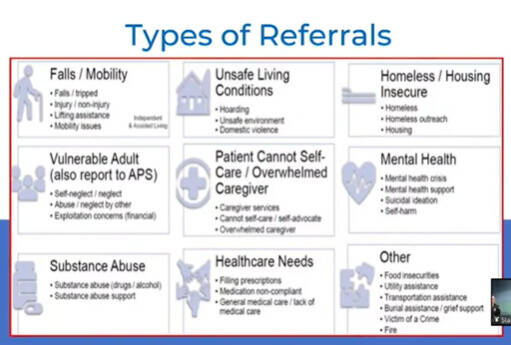Since January, Mercer Island’s fire department and Youth and Family Services (YFS) division have teamed up to implement the Mobile Integrated Health (MIH) Program on the Island.
Backed by funds through the six-year King County Emergency Medical Services Levy approved in 2020, fire personnel refer individuals to YFS while responding to calls if the residents require additional assistance for their complex needs, according to YFS Administrator Tambi Cork and Interim Deputy Fire Chief Doug McDonald.
Speaking during a study session at the Mercer Island City Council’s regular meeting on March 21, Cork and McDonald discussed the benefits of bringing the program to the Island to address mainly elder-care situations like falls, mobility issues and more. As of the meeting date, Cork said that YFS had received 34 referrals from fire personnel, and the YFS team’s MIH intervention specialist and others followed up with 26 of the residents and will continue providing support to them.
“We’ve already seen a lot of successes, we’ve already seen impact and it’s just a really great collaboration between two city departments to better serve Mercer Island residents,” Cork said of the new program.
Added McDonald: “Mobile Integrated Health allows us to move towards meeting the community’s complex needs in a fiscally responsible manner by facilitating better care and in a more efficient way.”
On the funding front, a city document noted that Mercer Island can utilize about $110,000 a year in reimbursements throughout the duration of the levy for MIH191-related personnel costs, program support, vehicle use and maintenance, technology, dispatch costs and more.
When fire personnel respond to emergencies, they often interact with low-acuity or frequent 911 callers, which fall into the nontraditional and nonbasic life support treatment realm, McDonald said. Individuals are sometimes transported to emergency rooms, but the situation doesn’t always require a transport. If fire personnel decide to refer the case to YFS, its intervention specialist will be notified and step into the situation, with an MIH team available to provide follow-up services, according to Cork.
In addition to the aforementioned elder-care cases, other common types of MIH-referred situations may include unsafe living conditions, mental health, substance abuse, healthcare needs and food insecurities. While the program can provide some services in house — including visits with YFS therapists — they also refer some cases to King County falls prevention, hospice care or case managers.
“To have our case manager integrated into the fire community, integrated into the YFS community and interacting with these residents allows for some ongoing support of evolving situations,” Cork said.
For more information, visit https://www.mercerisland.gov/yfs/page/mobile-integrated-health-mih.


